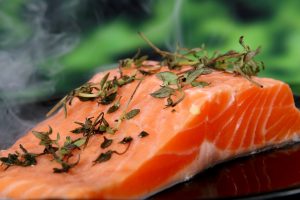Diet, as opposed to medication, is probably the best way to lower your bad cholesterol (LDL) while raising the levels of good cholesterol, which is called HDL. Different food has different effects, for example, soluble fiber binds cholesterol while it is in the digestive system, so it can’t enter your circulatory system. Foods with polyunsaturated fats lower LDL, while certain plant stanols and sterols in food block cholesterol absorption. Here are five foods that can help you fight high cholesterol levels:
1. Oatmeal
Oatmeal is rich in soluble fiber, which lowers LDL cholesterol. How this works is the soluble fiber binds itself to the body’s bile acids and is excreted. The body needs to produce more bile acids because they are essential for digestion, and the way to do this is to use up LDL cholesterol in the acid’s creation. You should eat at least 5-10 grams of soluble a day.
2. Salmon
Salmon is a fatty fish full of omega-3. This type of fat has been shown to help produce good cholesterol, HDL. You should eat at least 2 servings of fish a week to enjoy the benefits.

Foods That Help Lower Bad Cholesterol: Salmon
3. Walnuts
Unlike other types of nuts, walnuts are rich in omega-3 fatty acids, just like fish. People who eat walnuts can lower their LDL by as much as 10%. You really only need a handful of nuts a week to see good results. Just make sure the nuts are in their raw form and not salted or coated in sugar.
4. Apples
Apples (and other fruits like citrus, grapes, and strawberries) have pectin, which is a form of soluble fiber. As you read before, this soluble fiber prevents LDL cholesterol from being absorbed in your blood. Since pectin is a soluble fiber, it goes into the recommended 5-10 grams a day, but since apples are rich in other nutrients, you can follow the “apple-a-day” advice and see other health benefits.
5. Avocados
Though they contain fat, avocados also have phytosterols, which are plant sterols. These compounds are similar on a structural level to cholesterol without all the negative consequences, and “replace” cholesterol in the intestine. The replaced cholesterol then leaves the body, reducing overall LDL levels. If you are overweight, an avocado a day can make a big impact.




